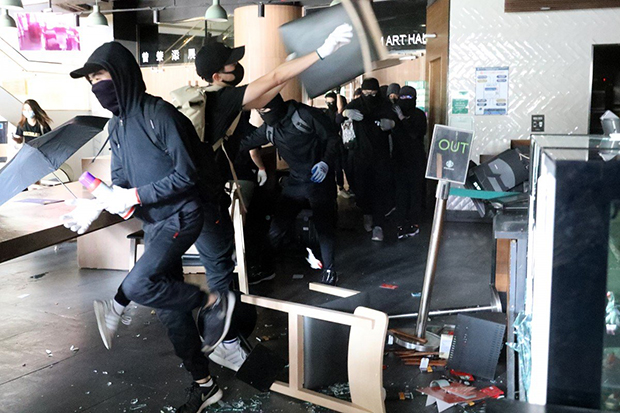
Scores of mainland Chinese students have fled Hong Kong over fears they will be attacked in retribution for the death of undergraduate Chow Tsz-lok on Friday.
The Hong Kong University of Science and Technology (HKUST) student died four days after falling from a car park in Tseung Kwan O as a police dispersal operation, which included the firing of tear gas, took place nearby.
News of Chow's death led to more violence at HKUST, with protesters trashing the residence of university president Wei Shyy, and vandalising a Starbucks, a Maxim's canteen, and the campus branch of the Bank of China.
Already on edge over the anti-mainland Chinese sentiment among protesters - and after a mainland student was attacked on campus on Wednesday - dozens of others at HKUST are leaving or have plans to do so, afraid they could be next.
"I don't want to become the next mainland student who runs afoul of the local students and gets beaten or is forced to apologise," said Adam, a mainland student who declined to give his real name for fear of being identified. He left for Shenzhen on Friday night.
That fear was heightened after a student named Zheng was beaten up at a forum on Wednesday. He was accused of shoving a local student to the ground.
But, video footage of the incident appears to show a masked man in black obstruct Zheng before suddenly falling to the ground after brushing up against him. The mainland student suffered head injuries in the attack, and left for Shenzhen on Thursday night in fear for his safety.
A doctoral student, who gave his family name as Feng, said he was disappointed that Shyy had remained silent over Wednesday's incident, but cried when announcing Chow's death and earlier vowed to condemn police if they had violated tear gas firing guidelines in the incident.
"I am really disappointed by our university's double standards as our president never responded to Zheng's unfair treatment but reacted quickly to Chow's death," said Feng, who left Hong Kong for Beijing, via Guangzhou, on Friday evening.
Another doctoral candidate surnamed Li said he was angry over the university's inaction and indifference over Zheng's injuries, and worried about his own safety.
"The violent protesters have already trashed Maxim's canteen and a Bank of China branch. Are they going to beat up mainland students next?" he said.
In an open letter to Shyy sent on Friday, mainland Chinese professors at the university said there had been a failure to protect staff and students.
"During Wednesday's forum, we witnessed a large ... mob attack of one of our very own students, right in front of you and right under the spotlight," they wrote.
"We hereby strongly urge the university to come up with effective measures to restore law and order to our campus."
The university issued an emergency broadcast just after lunch on Friday, warning students and faculty members that violence had erupted on campus.
"When Typhoon Mangkhut struck in 2018, the university - which was badly damaged by the storm - did not issue any emergency broadcast," said Adam, adding the announcement had exacerbated his fears.
Some mainland students said they had begun to have second thoughts over staying in Hong Kong, which has entered its sixth month of protests triggered by the now-withdrawn extradition bill.
"When the unrest calms down, I plan to look for exchange programmes to other countries such as Britain," Feng said.
Adam said all he wanted was, "to read books and continue my research in a quiet environment", but was not sure the university could protect him if further clashes broke out.
Zhou, a computer science student, said he was concerned about the university's ability to ensure the safety of mainland students.
"Without a guarantee of security offered by campus guards, what if the next clash between mainland and local students escalates into an uncontrollable situation that might become the point of no return?" Zhou said.
He has chosen to stay in Hong Kong since he is confident he can keep himself safe, but said six of his seven closest friends left for Shenzhen on Friday.